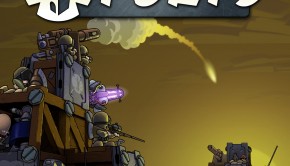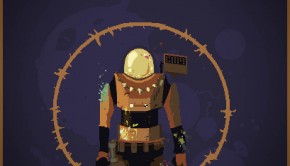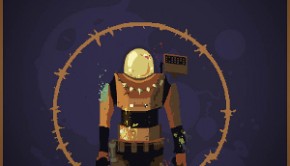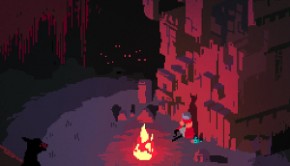Sean Beeson Interview: Developing an iOS Niche
Sean Beeson has found a niche in the industry by scoring several games for the iPhone and iPad. With titles such as Goop, Mecho Wars, and Steam Pirates, he has entertained listeners with high quality music. His other projects include a line of films, a high-profile trailer, and a contribution to a newly released sports game.
In this interview, Beeson discusses his experiences creating music for the iPhone. He focuses in on several games while discussing his general approach to composition and technology. He rounds off the interview by discussing his past roles working on sample libraries, administering the game audio network guild, teaching electronic composition courses, and even moving lawns.
Interview Credits
Interview Subject: Sean Beeson
Interviewer: Chris Greening
Editor: Chris Greening
Coordination: Ashli Norton
Interview Content
Chris: Sean Beeson, welcome to the site. First of all, could you tell us about your background? How did you come to love music and games?
Sean Beeson: From the time I was a young kid, I have always been interested in technology and computers, but more specifically games and music keyboards. I played Atari all the time as a kid (and picked up dozens of games at garage sales for a quarter), and a few years later my parents bought us a Sega Genesis. So I was growing up playing games like Strider, Altered Beast, Gain Ground, andCastle of Illusion, all of which have great scores.
When I was about eight years old, my uncle bought me a little casio keyboard, and my mind was blown by all of the patches, instruments, and rhythms it had in it. Since then I have never stopped playing games or musical instruments. From playing the keyboard along to SNES games, to recording my own songs to be used in games made up in my head, I am living my dream job!

Chris: You made a remarkable career shift in 2005 from experienced groundskeeper to media composer. What inspired this? Was it initially challenging to find clients?
Sean Beeson: During the time I was a groundskeeper at Cranberry Hills G.C., I was also in college studying for a degree in Music Composition, so it was more of a seasonal job than anything else. However, mowing for hours and hours at a time gave me the opportunity to write music in my head, which looking in retrospect was an incredibly important phase in my development as a composer.
One year, after having saved enough up money, I decided I was going to do nothing but write music full time, regardless if I had clients or projects. And so for about three months, I would wake up early and write until I was exhausted and my brain was fried. During that time period, I gained a few clients and sold enough music to realize that, if I continued to invest that time on a regular basis, that I could sustain a full time career as a composer. That was six years ago and I haven’t looked back since.
Chris: During your university years, you worked on numerous student films. What did you learn during this period? Were there any particularly memorable highlights?
Sean Beeson: Although I still scored and will continue to score films, I think the biggest thing I learned is that I wanted to score more games! Even though I was always looking to score games or game mods, at that time, in 2003 it was much easier to find student films (shorts, animated, features) to score than finding a game development team that would actually finish their projects.
So while I struggled to discover where I belong as a composer, I had the revelation that I wanted to pursue scoring games even more. I was passionate about all kinds of scoring, but simply didn’t enjoy watching films as much as I did playing games. On weekends during my free time, I didn’t sit down and watch a stack of movies — I sat down and played game after game after game.
Chris: You’ve since carved a niche for yourself scoring projects for iPhone titles. What attracted you to such media? What are the unique musical and technical demands working for mobile projects?
Sean Beeson: I don’t think I landed in scoring iPhone titles intentionally, and haven’t limited myself to just that platform, but I am continually hired by iPhone developers because of the high-quality production and immersion levels of my orchestral music. I also have worked on a few console titles and am working on a few more that unfortunately I can’t talk about just yet.
Of course, I do love composing music for independently developed games, and the iDevice platform is one of the best ways for independent developers to get their games out there. The developers are great to work with, enthusiastic, and incredibly open to my musical suggestions.

Chris: One of your breakthrough works, Mecho Wars, is filled with vibrant electronic sounds. How did you manage to craft a score that was simultaneously cutting-edge yet nostalgic for this title?
Sean Beeson: I wanted to approach scoring the game the same way I would score a game that required a full orchestral score, but I knew it needed timbres and tones that are not native to the acoustic orchestral palette. In effect, I treated acoustic instruments the way I would treat electronic timbres, and integrated synthesized sounds as organically as possible.
It was a challenge, and looking back there are things I wish I could have added to the soundtrack, but hopefully there will be a sequel down the road where I can do that.
Chris: In contrast, the music for the epic space opera Dangerous demonstrates your capacity for cinematic orchestral scoring. Can you tell us more about your score and what influenced your approach?
Sean Beeson: The score for Dangerous is incredibly diverse and large for an iPad game. It features a lot of epic orchestral cues, a handful of more heart-felt ones, and even some bizarre pieces that you might have a hard time believing I wrote!
Linh, the developer of Dangerous, gave me a ton of creative freedom for the score, and so I took it as an opportunity to explore tonality, dynamics, and production techniques. Although it doesn’t share a striking resemblance, the score is a combination of flavors possessed in Star Wars and Mass Effect.
Chris: A different sort of lyricism can be heard on the award-nominated score for Disney’s Pixie Hollow. What is your process for finding and embellishing memorable melodies for projects like these?
Sean Beeson: Singing in the shower can work wonders! Seriously though, I have spent as much time crafting memorable melodies for Pixie Hollow as what I have writing the pieces. If the melody is not hummable after listening to it a few times, I will rework it until it gets to that point.
Sometimes there is a bit of a downside when writing some simplistic melodies though. They can become a bit generic, but at the end of the day, it isn’t always how things are made but how they are perceived. Writing melodies that way can result in pieces that are constructed from diatonic, stepwise melodies that seem plain, so creating a magical accompaniment to support the otherwise familiar melodies is vital! That means lots of trills, lots of keyboard percussion, and magic.
There are times whe In will write a piece with a memorable melody, and then parts of that melody end up in another piece, and parts of that melody end up in another piece. So developing a “sound” from the beginning can be an important part to creating a structured, cohesive, and developed soundtrack.
Chris: The aforementioned scores were mainly created digitally. How did you ensure they still were high quality? Were your previous experiences working on orchestra sample libraries useful?
Sean Beeson: With all of my work, I simply try to create music that is as pristine sounding as possible. Sometimes it authentically mimics live players in an orchestra, and other times it doesn’t, and that is ok. It simply has to sound good!

My previous experience working with orchestral sample libraries and creating sample libraries has been incredibly helpful. Rarely do I use any sounds straight out of the box. I will either customize them with filters and controller mods, synthesize my own, or record and create my own. I liken it to baking a killer pizza. Sure you can slap any kind of cheese and toppings on a boxed crust, but if you really know what all of the ingredients taste like and how they can complement each other, your pizza will taste much better.
Chris: In other roles, you were an administrator at the Game Audio Network Guild for two years. Could you elaborate on your activities here? Are you proud of what you achieved for the organisation?
Sean Beeson: My day to day tasks consisted of interacting and working with the officers, the board of directors, and the community. Sometimes that would mean answering questions members had on the forums, and others times assisting the officers with guild events. GANG was and is constantly evolving, and so did my roles. It was always something different, and always something new!
I alone cannot take credit for anything that the guild achieved, as many of the larger developments were the culmination of years of planning and development by the other officers, directors, professional branches, and members. I am happy that I was able to help members and provide resources to them that they would maybe not otherwise have access to.
Chris: Until recently, you taught electronic composition at the Capital University Conservatory of Music. Can you elaborate further on your role? What are the positives and negatives of teaching for you?
Sean Beeson: The best thing about teaching was interacting with the students and hearing what they enjoyed listening to. From rock, to musique concrete, it was something new every week. I was exposed to styles of music and bands that I had never heard of, but when you listen to 8 hours of new music a week you come to expect that!
The worst thing about teaching was that it was less time for me to write music. Especially during midterms and finals, grading pieces and projects took a big chunk of my time.
Chris: Before we close, we’d love you to discuss your music for your latest iPhone projects, Aiko Islands andGoop, in more detail. What styles and themes define these light-hearted titles?
Sean Beeson: Goop‘s music is whimsical and light. It features playful, short, motifs played by solo winds that are surrounded by a magical accompaniment. The music develops quickly and takes the player through a casual adventure. It tells a story without exceeding the boundaries of the piece, which matches the pacing of the game!
Aiko Islands‘ score is also driven through motifs, although they are a bit longer and and more thoroughly developed. The nature of Aiko Islands gameplay requires a more subtle underscore (Ice, Desert, Forest, ect.) to create its atmosphere. I think the underlying goal with both scores was to create something humable, entertaining, and fun.

Chris: Several indie composers, notably Danny Baranowsky and Josh Whelchel, regularly release their soundtracks digitally. Are you interested in doing this or do you think they’re best contextually?
Sean Beeson: Most of my scores are released as soundtracks, though they have all been put onSoundcloud for free. It a great promotional tool for the games, and for my business, as a lot of my clients have discovered my music through promotions generated by the albums.
However, I am working with two different developers to release soundtracks for their games, so there will be a few albums of my music for sale in the near future!
Chris: Most of your works have been for independent and small developers. Would you like to continue focusing on such games, or would you one day like to score a blockbuster game or movie?
Sean Beeson: Simply put, I love games! Haha. Even if I didn’t write music for games, I would still be a hardcore gamer. Now, I wouldn’t ever turn down an exciting film gig, or the next big TV show, but if I had to pick only one, I think you know which one it would be.
As for the size of the games I score? I urge people to listen to my music. Is it really that different from larger, blockbuster games? I try to treat every game, big or small, as my next big, blockbuster, breakthrough, score. Even if the games are tiny, every step forward I make is the biggest one I can take at that time. Of course, would I jump at the opportunity to score the next big game? The next cult classic? The next best seller? No doubt! Hopefully that will come sooner than later!
To my clients, what I am scoring is also a big investment, so I my work very seriously. We are reaching a point where the developer, the platform, and the scale of a game is almost erroneous.
Chris: Many thanks for your time today, Sean Beeson. Is there anything else you’d like to say about your life and works? Best wishes for the future.
Thank you for your time. Hopefully I didn’t bore anyone too bad reading this! Check out my website and music: seanbeeson.com and follow me on Facebook and Twitter.
Posted on August 1, 2011 by Chris Greening. Last modified on April 9, 2014.















